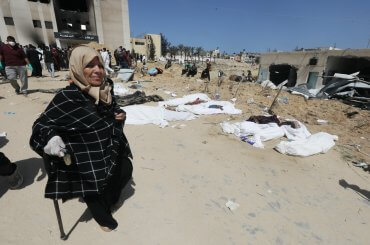Today IMEU held a phone conference with three experts on Palestinian prisoners: Sahar Francis, Director of Addameer: Prisoners Support and Human Rights Association; Ruchama Marton, founder of Physicians for Human Rights-Israel; and Bill van Esveld of Human Rights Watch. Some basic facts about the prisoners:
How many prisoners are under administrative detention?
FRANCIS: There are actually 308 administrative detainees in the Israeli prisons. Of course, 1000s of Palestinians have been subjected to it. During the Second intifada, more than 2500 were held under administrative detention. And administrative detention [facilitateds] torture because the prisoner never knows when he will be released or what he has to argue in order to be released….
National Public Radio just called administrative detention controversial. But is it illegal?
VAN ESVELD: The idea that you can lock up 100s of people at any given time– and over the years 100s and 1000s of people– without any due process rights, really turns human rights law on its head. The exception has become the rule in the Israeli case, and administrative detention has become the ‘go to solution’ [in case in which authorities] don’t have the evidence… It shouldn’t take prisoners and detainees putting their lives at risk to make Israel wake up to the idea that this whole regime of administrative detention runs afoul of human rights law.
What is the total number of Palestinian prisoners in Israeli prison, and why are they there?
FRANCIS: There are 4700 prisoners, including 220 minors under 18, seven women, 308 administrative detainees, and 27 Palestinian M.P.s [members of Parliament].
Eight hundred of those prisoners are in for life [presumably for more serious offenses]. The majority of prisoners were arrested for political reasons. Being a member of [almost any] Palestinian party is illegal. Demonstrations against the wall or against settlements are illegal. From 1967 till now, 800,000 Palestinians have been arrested and imprisoned. Addameer estimates that about 40 percent of the Palestinian male population has been arrested at least once in their lives.
How does Israel justify these punishments?
VAN ESVELD: Israel’s official position is that it has no obligations to Palestinians in the occupied territories– no human rights obligations. The UN Human Rights Committee has consistently said that administrative detention is practiced in an unlawful way. Israel says that it is [carried out] for security [purposes] and it has no human rights obligations [to people under occupation].
What is the difference between this hunger strike and predecessors?
FRANCIS: It’s a very different atmosphere. [Because there are many] other campaigns in the occupied territories, with the support of international activists. This time the role of the prisoners is taken very seriously [internationally].
This strike has gotten global attention. What about coverage inside Israel of the hunger strikers?
MARTON: I was in a coffee shop. I asked the waiter who was really nice [what he thought about the hunger strikers] He said, ‘Is is still going on? What do they want?’ He didn’t know…. We don’t have the exposure that we hope to have. [Here are strikers going 77 days without food] risking their lives, and there are very small echoes of this in the Israeli media.


On Israeli attitudes to the hunger strikers and Palestinian prisoners in general, see Amira Hass: http://www.haaretz.com/opinion/for-israel-punishing-palestinians-is-not-enough-1.427649
From Hass’ article:
Van Esveld–Israels position is that it has no human rights obligations to Palestinians in Occupied Territory, the Geneva conventions 1949 and the Hague Regulations 1907 are both mandatory on Israel, it is incumbent on other signatories to those treaties to ensure the Palestinians have those rights and to take steps against Israel for such flagrant abuses of them. The European- Israel trade agreements have within them clauses on human rights which must be observed, if only they had the political will to enforce them, as one of Israels biggest export markets they could apply enormous pressure.
in a way they hold the whole world hostage
Mahmoud Sarsak, a member of Palestine’s national football team, was arrested in 2009 on the way to join the squad. He’s never been charged. He has been on a hunger strike for 58 days now and has refused to stop.
Also: Son OF Arab MK Held For Refusing Military Service
http://www.imemc.org/article/63490?utm_source=feedburner&utm_medium=feed&utm_campaign=Feed%3A+PalestineNews+%28Palestine+News%29
By the way all: the IMEU internet radio interview that Phil links to at the top of the article is available as a podcast, including their entire archive of interviews:
IMEU | Blog Talk Radio Feed
Always a good listen.